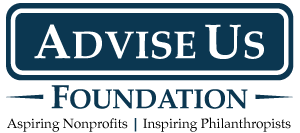This year the Chronicle of Philanthropy revealed the “50 Most Generous Donors of 2013.” While many donors on the list donated to private foundations, the donor couple topping the list with the most charitable giving, Facebook’s Mark Zuckerberg and his wife Priscilla Chan, gave their gift to a donor-advised fund. This was the first time a donor-advised fund was the top charitable recipient for living donors. Fifth on the list were John and Laura Arnold, who use a donor-advised fund in addition to a more traditional foundation. Similarly Pierre and Pam Omidyar, seventh on the list, use donor-advised funds in addition to foundations and social impact funds for their charitable giving. The biggest donors in America may be using donor-advised funds – but they aren’t the only ones.
Donor-Advised Funds vs. Private Foundations – Numbers and Trends
Over the past century, many large private foundations, like the Bill and Melinda Gates Foundation, have made transformative gifts making an impact throughout the world. But while the biggest foundations often get the most notice, two-thirds of the 86,000 private foundations in existence have less than $1 million in assets. Nor are most foundation as old as most people think – sixty-percent of foundations were formed within the past 15 years – and forty-percent in the last decade. These are big numbers – over 34,000 foundations formed in the last ten years – and foundations are the right charitable vehicle for many donors. But they are being surpassed by a “user-friendly” charitable vehicle that’s lower cost, “faster” and more direct for many donors – the donor-advised fund.
Over just the last five years – from 2007 – 2012 – the number of donor-advised funds grew by over 41,000 funds and the total number of funds now more than doubles the number of private foundations. What accounts for the popularity and growth of donor-advised funds?
3 Donor-Advised Fund Advantages Appealing to Younger Generations
Advantage #1 – User-Friendly
For as little as $2,500 you can open a donor-advised fund. Mark Zuckerberg and Priscilla Chan used a gift of appreciated stock – a popular and savvy way to maximize your charitable giving and the tax deductibility of your donation. Other types of assets can also be donated. You take an immediate deduction on your charitable gifts to the fund in the year you make them – and have a minimum amount of paperwork required after opening the fund. Donor-advised funds avoid many of the tax filing requirements, governance issues or legal and accounting costs of private foundations and many other charitable vehicles.
A donor-advised fund also doesn’t cost a lot to establish and maintain. Many experts suggest that the economics of foundations don’t make sense for under $1 million because the maintenance costs are too high – and charitable trusts and other vehicles often require at least hundreds of thousands of dollars in assets to make financial sense. For many people, donating from $2,500 to millions of dollars in a year, the minimal costs of maintaining a donor-advised account are among the lowest for charitable giving vehicles.
Advantage #2 – Fast
When Mark Zuckerberg and Priscilla Chan recently recommended a $25 million grant from their donor-advised account to fight the Ebola virus in Africa he explained their thinking. “We believe our grant is the quickest way to empower the [Centers for Disease Control Foundation] and the experts in this field.” While Zuckerberg and Chan may have consulted others – there was no need to check if the grant purpose or recipients matched any organizational philosophy beyond their own personal ones as long as they were donating to a charitable organization such as a 501c3 nonprofit. The process to send the money was also fast. They separated the efficient giving transaction from the rant by giving the stock earlier and therefore did not have to wait to figure out the stock gift before making the grant. What’s true for a $25 million donor-advised fund gift is true for a $50 gift from a fund holding $2,500. Donor-advised funds offer the speed to address charitable challenges and realize charitable opportunities quickly.
Advantage #3 – Direct Impact
When Mark Zuckerberg and Priscilla Chan made their gift to battle the Ebola crisis they were doing what many in their generation seek to do. Zuckerberg described their goal as to “directly help the front-line responders in their heroic work.” Emmett Carson of the Silicon Valley Community Foundation describes the philosophy as “you bet on the best actors, you go in aggressively, and you try to make a difference.” This philosophy is not only “large-scale.” Studies show generation “X” and “Y” (the “Millennials”) often want “to see the direct impact of their donation” even in more modestly sized donations.
Donor-advised funds offer flexible vehicles that allow donors to give and test the impact of their gifts on their own schedule. Donors don’t have to immediately make an outright gift or create a charitable trust (with a single irrevocable charitable beneficiary) because of a life transition or a business sale. Donor-advised funds provide the flexibility to achieve results.
The Charitable Spirit of Upcoming Generations
Donor-advised funds fit the spirit of upcoming generations who value independent, quick and nimble ways to achieve results. While different charitable vehicles offer different advantages – and private foundations, charitable trusts and other forms of charitable giving may be right for many individuals – there is a reason donor-advised funds have grown faster in popularity. For many donors seeking to start a charitable vehicle, with from $2,500 to $2.5 million (and beyond) in assets or more, donor-advised funds offer the best combination of advantages for a great charitable giving experience. The donor-advised fund combination of easy-to-use, fast and flexible makes charitable giving simple and effective – and it’s hard to beat!
____________
Andrew Hibel serves as President and is the Founder of The Advise Us Fund. He is also Chief Operating Officer and Co-Founder of HigherEdJobs. Andrew holds a B.A. in Economics and a M.Ed. from the University of Illinois and a J.D. from Indiana University, Indianapolis. He has been a planned giving officer for Penn State University and Advocate Charitable Foundation and served as Director of Gift Planning and Estate Administration for the Jewish Federation of Metropolitan Chicago.
The information in this blog post is general and educational. It is not intended nor should it be construed as legal, tax, investing or financial advice. Individuals should consult with their own advisor about charitable giving arrangements The Advise Us Fund® may describe.

